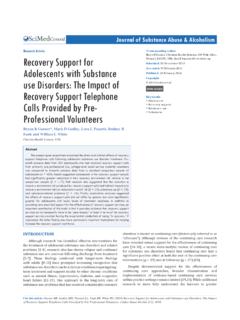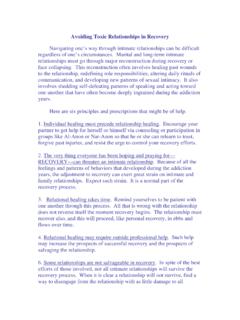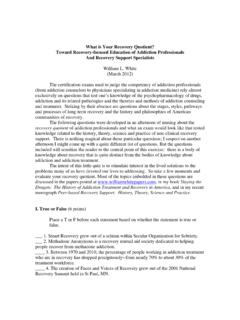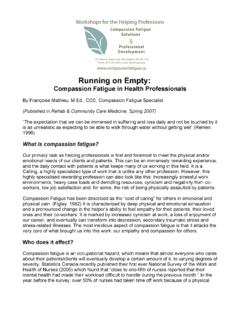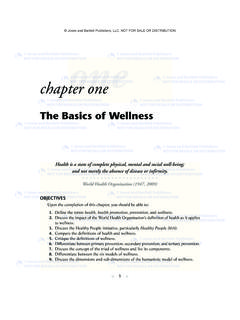Transcription of The Science of Addiction Recovery Mutual Aid: An …
1 White, W. (2013). The Science of Addiction Recovery Mutual aid: An interview with John F. Kelly, PhD. Posted at The Science of Addiction Recovery Mutual Aid: An Interview with John F. Kelly, PhD Introduction For past several years I have been interviewing pioneers who made significant contributions to the history of Addiction treatment and Recovery support in the United States. Most of these interviews have been made with individuals toward the end of a long career of such contributions. The following interview is something of an exception an interview with someone at mid-career who has already made a deep mark on our scientific understanding of Addiction Recovery Mutual aid in the United States.
2 Dr. John Kelly is an Associate Professor in Psychiatry at Harvard Medical School, Associate Director of the Massachusetts General Hospital (MGH)-Harvard Center for Addiction Medicine, and Program Director of the MGH Addiction Recovery Management Service (ARMS). He serves as a Board Member on the Executive Committee of the American Psychological Association, Division on Addictions, and as an Associate Editor for the Journal of Substance Abuse Treatment, and the journal, Addiction . Dr. Kelly has served as a consultant to the White House Office of National Drug Control Policy (ONDCP), the Substance Abuse and Mental Health Services Administration (SAMHSA), the Center for Substance Abuse Treatment (CSAT), and the Department of Education.
3 He has published more than 70 scientific articles, reviews and book chapters in the field of Addiction and together with William L. White, published the first text on the theory, Science , and practice of Addiction Recovery management. His latest collaboration is the book, Broadening the Base of Addiction Mutual Support Groups: Bringing Theory and Science to Contemporary Trend, which explores the growing diversification of Addiction Recovery support in the United States. I had the opportunity in the fall of 2013 to interview Dr. Kelly about his clinical and research activities. Please join us in this engaging conversation. Career Review Bill White: What circumstances brought you to the United States and your decision to pursue research on Addiction Recovery ?
4 Dr. Kelly: I was interested initially in becoming an Addiction counselor and came over to Minnesota from England in 1991. From there I pursued further education including a bachelor s degree in psychology and a PhD in clinical psychology. During these education and training experiences I became interested in relapse prevention and theories of behavior change. I was particularly interested in how remission and Recovery was maintained over time for individuals suffering from severe alcohol and other drug problems, what the mechanisms of such change were, and in strengthening clinical linkages to communities of Recovery , such as Mutual help organizations like AA, NA, and SMART Recovery to enhance long-term Recovery .
5 Bill White: You have had the privilege of teaching at some of the premier medical schools in the country Stanford, Harvard, Brown. How would you assess the current state of Addiction education in medical schools? Dr. Kelly: It s highly variable, but overall, vastly insufficient. When one considers that misuse of alcohol and other drugs constitutes our top public health problem and these problems pervade every area of medicine and psychiatry, there is too little emphasis on detecting, assessing, and treating substance-related conditions and problems. This needs to change. It s difficult as there are many competing needs in health, but it is clearer now than ever before that alcohol, tobacco, and illicit drug use are such major contributors to disability, disease, and premature death, that these should not only be taught, but should be a top priority.
6 Bill White: You currently serve as the Associate director of the Center for Addiction Medicine and the Director of Addiction Recovery Management Service (ARMS) at Massachusetts General Hospital. Could you describe these roles? Dr. Kelly: I help administer our Center for Addiction Medicine which includes obtaining grant funding and training of junior faculty and post-doctoral fellows in clinical research and the ethical and responsible conduct of research. In 2007 I helped found and create ARMS which is a clinical treatment and Recovery program for young people aged 15-25 years old. I help manage the program, staff, and conduct continuous evaluation of our clinical services.
7 Bill White: How has your sustained clinical work informed your research interests? Dr. Kelly: I have always enjoyed working with individuals with Addiction and related problems. My clinical work keeps me sensitized and tuned in on a daily basis to the real problems of substance use, related disorders, and Recovery . I use a measurement-based approach to my clinical practice so that helps me also to examine change over time at the individual level, which I find naturally generates hypotheses regarding factors the influence and explain treatment effects, such as gender, age, primary substance of use, social contexts, and broader Recovery capital. Bill White: You have also recently taken assumed leadership of the Recovery Research Institute (RRI) at Mass General.
8 Could you describe the work of RRI to date and your vision for its future? Dr. Kelly: I founded the Recovery Research Institute about a year ago with the help of some seed donations, and we are about to launch it formally at the end of October, 2013. One major goal of the Institute and related website ( ) is to be the go to place for the Science on Addiction Recovery where people can get the facts from what we hope will be perceived as a credible source ( , Harvard Medical School and Massachusetts General Hospital Psychiatry). Specifically, we want to summarize, synthesize, and present the Science of Addiction Recovery in such a way that it is understandable and usable by all types of stakeholders, from individuals in, and seeking, Recovery , to administrators and policy makers.
9 We hope that will help instill hope and help destigmatize Addiction also by providing helpful facts and information as well as treatment and Recovery links, opportunities to share your story and inspire others, and participate in research yourself so you can help inform our knowledge base on Recovery . I m very excited about this new initiative and I am hopeful it will do some good. Recovery Research Bill White: The aim of most Addiction -related research has been to elucidate the nature of the problem, but your research distinctively focuses on Addiction Recovery . How did you come to develop this focus on researching the lived solution to these problems? Dr. Kelly: Acute stabilization of individuals with Addiction is important and can be life-saving, but this is the easy part.
10 The real challenge is how to prevent relapse and enhance the chances of remission and stable long-term Recovery . From my clinical observations and clinical research experience, I can see this happens through extra-treatment factors, such as through social networks of Recovery support and family, although short-term treatment can play a critical role in making and strengthening those linkages. So, in answer to your question, this is the really interesting and intriguing part of Recovery to me; what happens in the days, week, months, years, and decades following formal treatment intervention. Bill White: You have conducted extensive studies of Alcoholics Anonymous. Early AA studies were criticized for their lack of methodological rigor.





